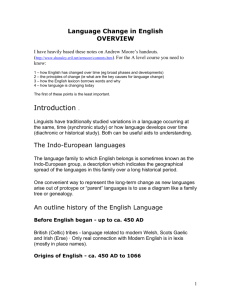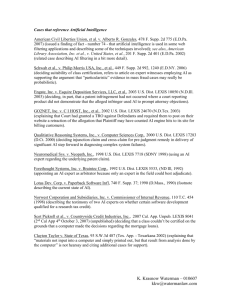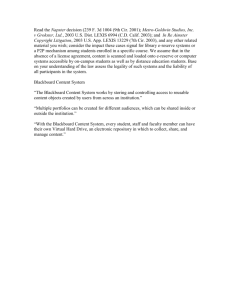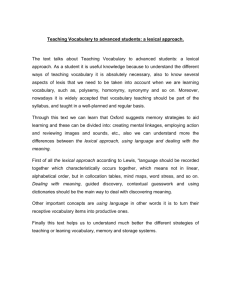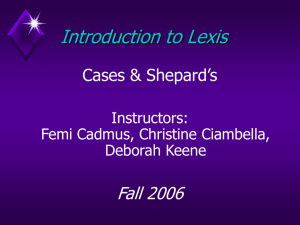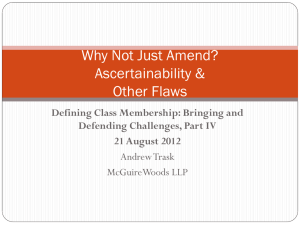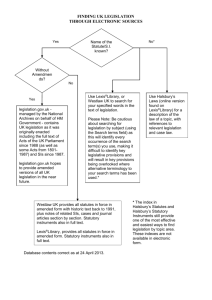Lesson 1 Lexis
advertisement
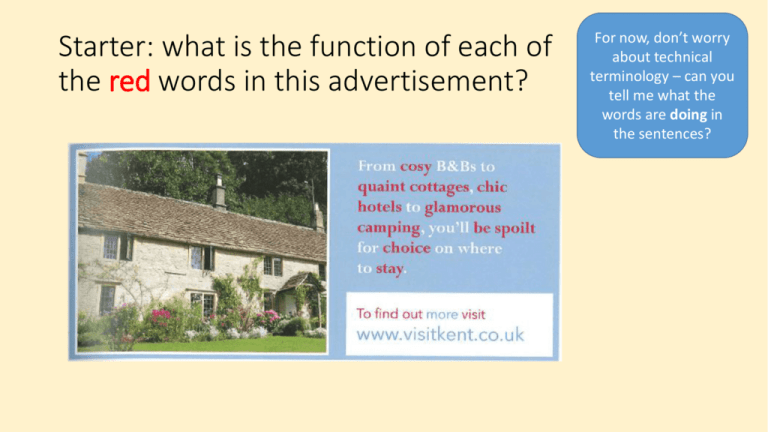
Starter: what is the function of each of the red words in this advertisement? For now, don’t worry about technical terminology – can you tell me what the words are doing in the sentences? Introduction to Lexis The lexis of the language is its vocabulary. With over a million words in English, “what kind of vocabulary is being used in this text” could be a bit of a daunting question. What we need, in order to carry out rapid stylistic analysis, is a system of lexical classification to draw on. There are many such systems – each with different strengths and limitations as an account of the English lexicon. The important thing at AS is to be aware of some of the lexical categories. The first way to categorise words is by their function in a sentence. This is known as their word class. This should be familiar from GCSE and you will need to be comfortable using this terminology! • Which are the nouns in the advertisement we looked at earlier? • Which are the adjectives? • Which are the verbs? Looking at open word classes. • Nouns name things or concepts. • Adjectives modify (i.e. accompany and slightly refine the meaning of) nouns. • Verbs show a state of being, action or event. • Adverbs act in a similar way to adjectives, and can modify verbs, adjectives, or other adverbs. • He ran quickly. (modifies the verb ‘ran’) • It was a very slow game. (modifies the adjective ‘slow’) • They were incredibly well organised. (modifies the adverb ‘well’) • These words classes are open word classes – they are generally open to new members. For instance, ‘Google’ has, in many languages, become a verb, i.e. ‘to google’, ‘I googled it’, ‘Er hat es gegoogelt’. The first way to categorise words is by their function in a sentence. This is known as their word class. This should be familiar from GCSE and you will need to be comfortable using this terminology! • Which are the pronouns in the advertisement we looked at earlier? • Which are the determiners? • Which are the prepositions? • Which are the conjunctions? Looking at closed word classes. • Pronouns substitute nouns, often referring back or forwards to them (e.g. it, he, she, you, that, who) • Determiners add detail or clarity to nouns (e.g. the, my, some). Numbers count as determiners. • Prepositions provide connections between words, often showing a sense of place or time (e.g. in, on, between, during) • Conjunctions provide connections between larger structures such as phrases, clauses and other sentences. You’ll cover this in more detail when you look at grammar and syntax. • These words classes are closed or grammatical word classes – they are generally smaller and tend not to have many new members added. Subclasses This should be familiar from GCSE and you will need to be comfortable using this terminology! • Each of the eight major word classes include subclasses. Looking at these in further detail can be extremely helpful in analysing how and why language is used to shape meanings and ideas. • Looking at the chart of word classes and the advertisement on the next slide, identify which word classes are used and what significance they have in terms of the text as a whole. • Consider what type of text (genre, register, mode) as part of your analysis. Bowers & Wilkins have been established as masters of sound engineering for almost 50 years. We are now able to bring that same expertise to the world of headphones; the same precision, the same care, the same extraordinary range and depth of detail is now available from an ultra-light, highly portable set of headphones superbly designed to fit into your life. The ‘Longman Dictionary of Contemporary English’ defines lexis in this way. The English lexicon Words used only or mainly in one region What do you think of the classification as a way of explaining the composition of the English lexicon? • Is it comprehensive? • Are the categories mutually exclusive? • Have any categories been left out? • Are the sub-categories under the right headings? • How would you improve it? Words which show a particular attitude Words used in a particular context British English Formal lexis D Biblical lexis Trademarks American English Informal lexis Legal lexis Written lexis Australian English Humorous lexis Taboo lexis Medical lexis Technical lexis Literary lexis Everyday lexis Archaic lexis Impolite lexis Old-fashioned lexis Other ways of classifying lexis Spoken lexis Dude, we totally know what you're thinking. That you'll have to wake up early. That we'll make you run all day with heavy stuff on your back. That you have to be drug-free, know how to read, and rank the U.S. as one of your top five favorite countries. Wrong, wrong, and wrong! And whatever else you're thinking? Wrong! The Army is actually a whole lot of fun. Picture this: You get up— ten, eleven, whatever's good for you. Then we have brunch. Pancakes, waffles, French toast, some grease if the night before was a rough one. Sugar cereals. Then, at 1200 hours—just kidding! nobody here uses that number thing anymore—around noonish we hit the Xbox for a few hours of Halo and all-you-can-eat Cool Ranch Doritos. It's combat training without breaking a sweat. After a quick nap, we pack in some more training by watching a JeanClaude Van Damme movie marathon. Then a dinner of chipped beef on toast, dehydrated mashed pota- Again, totally joking! We're having Taco Bell every night, all night, washed down by some of the best that Milwaukee has to offer. Extract from spoof U.S. Army recruitment pamphlet, by Joel Stein, in the New Yorker http://www.newyorker.com/shouts/content/articles/050822sh_shouts Putting this into practice. Using both your understanding of word classes and the lexical categories used by the Longman Dictionary, explore the lexis used in this spoof army recruitment pamphlet, which was published in the New Yorker. Consider how they lexical choices help the reader achieve their purpose. Putting this into practice. Using both your understanding of word classes and the lexical categories used by the Longman Dictionary, explore the lexis used in this Labour election campaign advertisement. Consider how they lexical choices help the reader achieve their purpose. Putting this into practice. Using both your understanding of word classes and the lexical categories used by the Longman Dictionary, explore the lexis used in this TfL warning advertisement. Consider how they lexical choices help the reader achieve their purpose. How confident are you feeling about referring to lexis? Homework • Find another text – it could be an advertisement, a website, a greetings card, an advert, a food package. Annotate it and write a short analysis (200-250 words) on the lexis used and how it helps the writer achieve their purpose. • Please hand-write your analysis and provide a copy of the text – photograph, print-out etc. • Due Tuesday 14th Sept.
